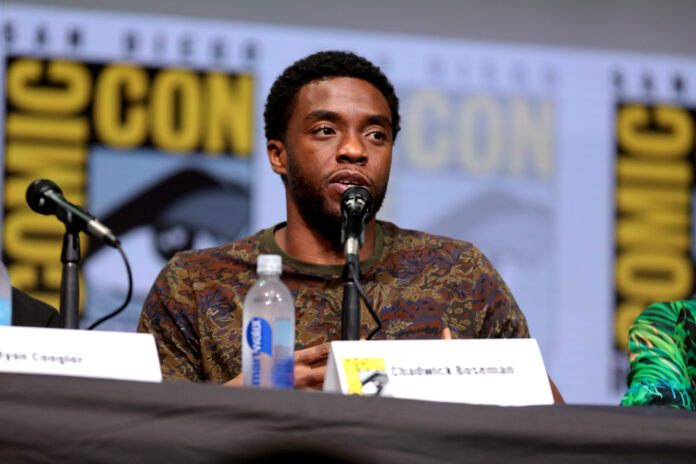
by Chelsea Herrera
This piece was originally published by Plugged, a partner of ATC, on their blog Views From The Revolution. For more writing from and about the global Black community, get plugged in here!
I didn’t grow up with an understanding of Black excellence, I suppose I was too busy trying to sort out what it meant to not be ‘Latina enough’ and in the same breath, not ‘Black enough.’ I wanted so bad to fit into both but there were always missing pieces. I wanted the Colombian identity that I held so much pride for, to hold me in the same way and I wanted it to cradle both my Colombian accent and my brown skin in its arms and reassure me that both could exist in harmony, maybe even nurture each other.
While eventually I would come to find peace within myself, I can’t help but wonder what it would have meant to the little girl from Houston, Texas, grappling with questions of diaspora, to have had a film like Black Panther, hold so many of her pieces with so much pride and grace.
On August 28th, amidst continued unrest and suffering, Chadwick Boseman, a hero to more than one generation of Black communities around the world, left us for another journey. Like Kobe Bryant, this loss carried with it a resounding tragedy, one whose pain was shared by millions and while he took with him the love of many, he left behind a legacy like no other.
From his role as Jackie Robinson in 42 to his role as T’Challa in heavily-awarded film The Black Panther, Boseman was our real-life superhero. With dedication, selflessness, and resilience beyond what so many of us can comprehend, Chadwick Boseman channeled the strength we aspire to foster within our communities, the pride and joy that we cling on to in the moments that prove unjustly difficult, and the hopes and dreams that we fight to hold space for and make true.
And yet, what is so hard about Boseman’s death is not just that we’ve been forced to say goodbye to a hero whose unwavering commitment to his community, uplifted us during the difficult realities of the last four years, but that we still needed him. Chadwick Boseman’s outstanding work in film, but most importantly in Black Panther, inspired greatness in people of all ages and identities.
If I close my eyes and try to picture my own relationship with Boseman, I see my friends, 21-year-olds, running around the parking lot of a small town AMC theater with their arms crossed over their chest shouting “Wakanda Forever!” over and over again. Their smiles are intoxicating and it’s as if we’ve been transported back to our childhood selves, the ones that desperately needed their own Wakanda, the ones whose roots, although forever tethered to the ancestral world, could so often be overshadowed and warped by whiteness and assimilation. But as King T’Challa battled to protect an African nation of tradition and modernity—a stark contrast from the Black suffering that we so often see on screen, we were reminded of our beauty and our humanity.
Chadwick Boseman, a Howard University graduate from South Carolina, reminded us that we are here to stay. Not just because of what we are and what we can be but because as history has shown, our greatness has existed, become stronger even, alongside our suffering. What we have done with that, even now as more Black bodies become hashtags and as we mourn the senseless murders of innocent lives, we see a long-overdue union among the diaspora, and we see Blackness celebrated, nurtured, and pushed to the forefront, like no other time before. Figures like Chadwick Boseman, Jackie Robinson, Thurgood Marshall, James Brown, T’Challa (and so many more) represent our past and our future. They represent our excellence.
In his 2018 commencement speech to Howard University grads, Boseman offered plenty, and yet what stood out to me the most were his final words of advice.
“When I dared to challenge the system that would relegate us to victims and stereotypes with no clear historical backgrounds, no hopes or talents, when I questioned that method of portrayal, a different path opened up for me, the path to my destiny.”
Yes, it is true that for four years, Chadwick Boseman battled colon cancer. But, it also true that for four years (and longer), Chadwick Boseman gave himself to his craft entirely, ensuring that present or not, he would always have a lasting impact on our lives.
For me, his outstanding performance as a Black leader, intent on loving and protecting his community, and eventually the diaspora at large, reminded me of a home away from home—of belonging.
For young Black boys everywhere, Boseman was a powerful representation of Black strength and goodness and for the world at large, Boseman’s work was a testament to all that we are capable of when we believe in our own beauty and in each other’s as well.
This article was published in partnership with Plugged.
Across The Culture works to make popular culture less maddening and more just. Our definition of pop culture might include your area of expertise. If you’re a brand interested in partnering to create such content, send an inquiry to zander@acrosstheculture.com.